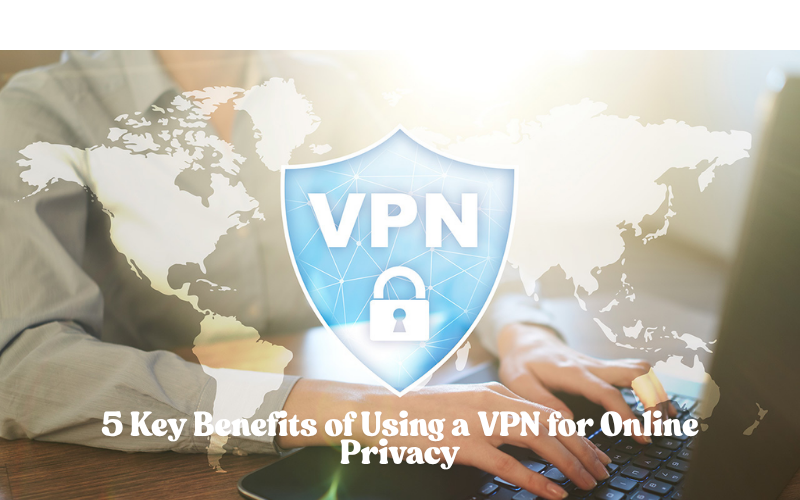Introduction
In today’s digital world, online privacy is more important than ever. With the rise of data breaches, hacking, and surveillance, users must take their privacy seriously. One of the most effective ways to protect your online privacy is by using a VPN for online privacy. A VPN for online privacy works by encrypting your internet traffic, making it difficult for hackers, advertisers, and even governments to track your online activity. In this article, we will explore the 5 key benefits of using a VPN for online privacy and why it’s essential to keep your data secure.
What is a VPN?
A Virtual Private Network (VPN) is a tool that creates a secure, encrypted connection between your device and the internet. When you use a VPN for online privacy, your internet traffic is routed through a secure server, masking your IP address and encrypting your data. This makes it nearly impossible for third parties to monitor your online activity or track your personal information.
A VPN for online privacy not only helps protect your data but also enables you to access restricted content from different regions. By connecting to a VPN server in a different country, you can bypass geo-blocks and access content that would otherwise be unavailable in your location.
Why is Online Privacy Important?
The internet has become an integral part of our daily lives, but it also comes with risks. From online shopping to social media, every action you take online generates data. Hackers, advertisers, and even governments often track and collect this data for various purposes. Without a VPN for online privacy, your personal information is vulnerable to theft, especially when you use public Wi-Fi or browse at home.
In recent years, data breaches have become more common. In 2020 alone, over 36 billion records were exposed through data breaches, according to Risk Based Security. By using a VPN for online privacy, you significantly reduce the risk of your sensitive data being stolen or misused.
5 Key Benefits of Using a VPN for Online Privacy
Here are the 5 key benefits of using a VPN for online privacy:
-
Encryption: A VPN for online privacy encrypts your internet traffic, ensuring that no one can intercept or read your data. This is especially important when using public Wi-Fi networks, which are vulnerable to cyber-attacks.
-
Anonymity: A VPN for online privacy masks your real IP address by replacing it with the IP address of the VPN server. This helps protect your identity and prevents websites from tracking your browsing behavior.
-
Bypass Censorship: In some countries, internet censorship restricts access to specific websites or services. A VPN for online privacy allows users to access restricted content by connecting to a server in a different country, thus bypassing these geographical restrictions.
-
Protection from Data Breaches: With cybercriminals targeting data on a daily basis, a VPN for online privacy ensures your sensitive information remains private and secure. VPNs prevent man-in-the-middle attacks, where hackers intercept communication between you and websites.
-
Safe Online Transactions: Whether you’re shopping online or banking, a VPN for online privacy ensures that your financial information remains secure. With encryption, it adds an extra layer of protection for sensitive transactions.
What to Look for in a VPN for Online Privacy
When choosing a VPN for online privacy, it’s important to consider these key features:
-
No-logs Policy: Make sure the VPN provider has a strict no-logs policy, meaning they don’t store any data about your online activities. This ensures that even if authorities request information, the VPN provider has nothing to hand over.
-
Strong Encryption: Look for a VPN for online privacy that offers strong encryption, like AES-256, which is considered the gold standard for online security.
-
Kill Switch: This feature ensures your internet is cut off if the VPN connection is lost, preventing exposure of your real IP address.
-
DNS Leak Protection: Good VPNs include built-in protection against DNS leaks, which can reveal your online activity even while connected to the VPN.
-
Speed: Although encryption can slow down your internet speed, top-tier VPNs minimize this impact, allowing you to browse, stream, and download without significant slowdowns.
Top VPN Services for Online Privacy
Here are some of the best VPN services for online privacy:
-
ExpressVPN: Known for fast speeds and strong privacy features, ExpressVPN provides military-grade encryption and a no-logs policy.
-
NordVPN: Offers top-tier security with double encryption and an extensive server network. It also has a strict no-logs policy and a CyberSec feature that blocks malicious websites.
-
CyberGhost: CyberGhost offers excellent privacy protections, an automatic kill switch, and a no-logs policy.
-
Private Internet Access (PIA): PIA is a cost-effective VPN with strong encryption, a no-logs policy, and customizable security features.
How a VPN Prevents Data Breaches
Data breaches are a constant threat to online security. Whether through hacking, phishing, or other methods, cybercriminals attempt to steal personal data every day. Using a VPN for online privacy ensures that even if a hacker intercepts your internet traffic, they won’t be able to read or exploit your data because it is encrypted.
VPNs for online privacy also help prevent man-in-the-middle attacks, where hackers intercept your communications. With a VPN, this kind of attack becomes much more difficult to execute.
Conclusion
In an era where online privacy is increasingly under threat, using a VPN for online privacy is one of the best ways to protect your personal data. A VPN for online privacy ensures that your internet traffic is encrypted, your IP address is masked, and your online activities remain anonymous. Whether you’re browsing on public Wi-Fi, accessing geo-restricted content, or protecting sensitive data, a VPN is an essential tool for maintaining online privacy.
By choosing a reputable VPN for online privacy that prioritizes privacy and security, you can safeguard your online identity and enjoy a safer, more private internet experience.
Sources
-
TechRadar: https://www.techradar.com
-
CNET: https://www.cnet.com
-
PCMag: https://www.pcmag.com

